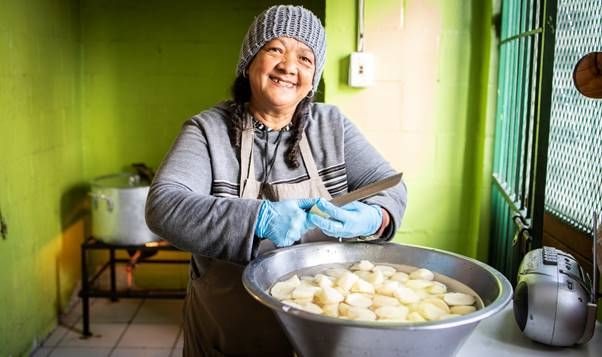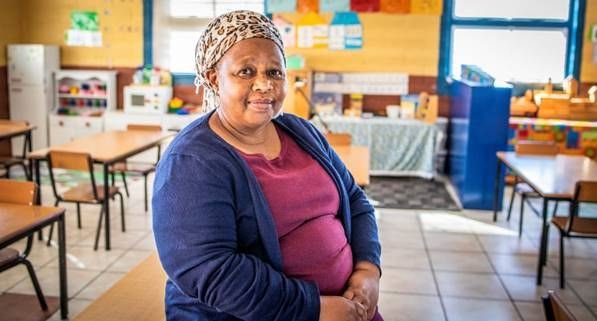






What makes this even more worrying is that in 2019, research conducted by the Human Sciences Research Council (HSRC) and the South African Race Relations Institute (SARRI) found that 60% of South African children have absent fathers and more than 40% of South African mothers are single parents, compared with 25% in the US and a developed world average of just 15%. Unemployment among women has a significant impact on families’ ability to access healthy food.
“The impact of Covid-19 and its associated job losses are magnified when women, especially, are affected,” says FoodForward SA MD Andy du Plessis. “Research has shown that where women are the primary caregivers, the funds they generate are directed to the care and needs of their entire family. In many cases, however, we find that their focus extends beyond their own families to that of their communities.”
“Women make sure that the children in their communities are fed and clothed too. They, instinctively, take on the role of caregivers and giving them access to food is therefore critical to our efforts and impact,” says Du Plessis. Women (adults and girls) make up 53.1% of FoodForward SA’s total beneficiaries.

“A perfect example of caregiving being extended to people outside of the immediate family unit is that of Thobeka Mbula’s decision to launch Mzamo Educare in Khayelitsha in 2010,” says Du Plessis. Mbula’s story begins in 2002 when she worked as a nanny in an affluent Cape Town suburb. During her daily commute to and from work, she often saw many little children in Khayelitsha wandering unsupervised on the streets who are vulnerable to rape and other criminal elements.
After eight years of employment, Mbula had saved enough money to leave her permanent job and address this problem. After obtaining the necessary qualifications, she opened her home to the community in 2010 as a safe space for unsupervised children where they would be protected and where they can develop optimally. She was overwhelmed by the community’s response and the school quickly swelled in numbers. She now has 140 children and 11 staff under her wing. The team comprises six teachers, three volunteers, one cook and one security guard. All of the children come from low-income homes in the community and the school helps by teaching them numbers, shapes, creative art, life skills, constructive skills and gymnastics.

“One of Tobeka’s biggest challenges is that many of these children’s parents or guardians are unable to contribute towards school fees. Although this is financially constraining on the school’s day-to-day operations, she never turns any child away from her school. Her goal is to keep these vulnerable children from roaming the streets. We feel honoured that we can help lessen the burden by providing Mzamo Educare with monthly grocery hampers that contain an excellent variety of healthy and nutritious food.”
Another organisation that benefits from FoodForward SA’s donations of quality surplus food is Nonceba Family Counselling Centre in Khayelitsha. In addition to the 21 beds available to abused women, the shelter also offers counselling services, a school awareness programme and an aftercare programme from Mondays to Fridays which assists children with homework, teaches them life skills and offers them the opportunity to enjoy educational excursions.
FoodForward SA’s network of just over 1,000 beneficiary organisations include, among others, early childhood development centres, after-school care facilities and soup kitchens which are mainly run by women.
“FoodForward SA’s staff complement is moving closer to mirroring the population of the country,” says Du Plessis. “45% of FoodForward SA’s staff consists of women.” Similarly, almost 50% of FoodForward SA’s board of directors and senior management team consists of women. To help address this gap and to give more women the opportunity to work within the industry, among others, FoodForward SA’s Supply Chain Youth Internship was launched in 2019.
“The barrier to entry into the supply chain is prohibitive, but we are providing an internship for previously disadvantaged youth, of whom more than 70% are women,” says Du Plessis. “The consumer goods supply chain industry is mostly dominated by men – for now. However, at FoodForward SA we are breaking these stereotypical barriers. Two of our branches are run by women and we have women in senior roles in several branches. We also have a female truck driver and several women who operate our forklifts across the branches.